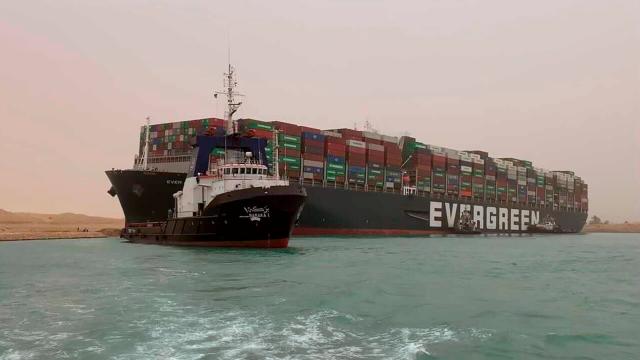The most relatable meme of 2021 thus far is a stuck boat. On Tuesday, the Ever Given, an enormous shipping container boat, somehow managed to wedge itself horizontally inside the Suez Canal, effectively cutting everyone else off from passing through. As of Wednesday morning, the 400-metre-long ship was partially freed, but not before it had ground global trade to a halt and effectively caused a pricey and enormous traffic jam, blocking around 100 other ships from passing through the canal. (We’ve all been there.)
What’s really wild is the temporary impact this maritime mishap has had on global oil prices–and what this says about our current fossil-fuel based energy system. Thanks to the stuck boat, the price of oil rose more than 2% on Wednesday following the ship snafu. This was pretty exciting news for traders: the price of oil has plunged more than 12% over the past few weeks, given some extended worries over the economic recovery during the late pandemic. OPEC, the international cartel that controls oil production and prices, said earlier this month it would discuss cutting production at its upcoming meeting given how low prices have been lately.
[referenced id=”1671547″ url=”https://gizmodo.com.au/2021/02/shell-says-it-has-reached-peak-oil-production/” thumb=”https://gizmodo.com.au/wp-content/uploads/2021/02/12/q2avq6r2hxr0oan7iabx-300×169.jpg” title=”Shell Says It Has Reached Peak Oil Production” excerpt=”Shell says oil is on its way out.”]
The Suez Canal is a pretty big deal when it comes to keeping our current energy system moving. Around 12% of global trade, including 9% of the world’s seaborne oil supply, flows through the canal any given day. While experts say the increase in prices from the Suez snafu will probably be temporary, it’s an important enough highway for the world’s oil that even a temporary traffic jam can cause a stir.
Inevitably, oil ships have to go through narrow straits or passages to deliver products ashore or reach other bodies of water; these passages are what’s known as choke points. The Suez Canal is one of the world’s most crucial choke points for oil transport; there’s only a handful of other places that serve similar purposes. These places, in turn, are incredibly vulnerable to not just stuck boats, but bigger disruptions like political instability, pirates, international conflicts, or natural disasters.
Most people don’t really conceptualise how turning our lights on and off is tied to actual barrels of stuff that is transported over land, over seas, and is affected by things like stuck ships or cold weather. It’s always a jarring reminder that our energy system relies on a supply chain that can be disrupted by little changes in a tiny area of the world–and how that fights over that supply chain has been the breeding ground for international conflicts, past and present. Now that we’re developing the technology to move beyond this system, it’s probably a good idea to get cracking–so we don’t have to worry about unwieldy boats in the future.
